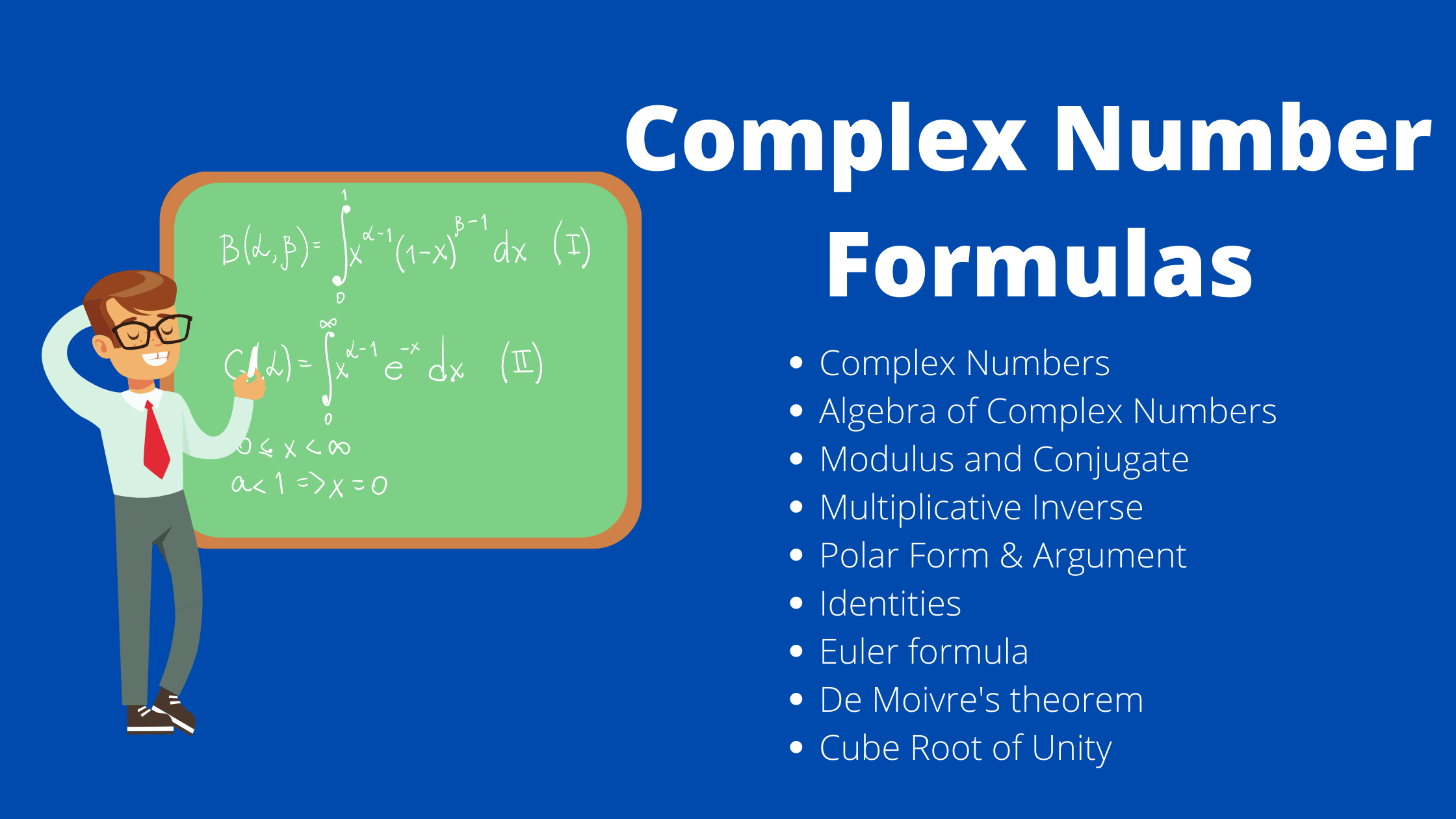
Complex Numbers is an important topic. Here are list of Complex Numbers Formulas
Complex Numbers
Complex numbers are defined as an ordered pair of real numbers like (x,y) where
$z=(x,y)=x+iy$ and $i = \sqrt {-1}$
and both x and y are real numbers and x is known as real part of complex number and y is known as imaginary part of the complex number.
Addition of complex numbers
Let z1=x1+iy1 and z2=x2+iy2 then
z1+z2=(x1+x2)+i(y1+y2)
Subtraction
z1-z2=(x1-x2)+i(y1-y2)
Multiplication
(z1.z2)=(x1+iy1).(x2+iy2)
Multiplicative Inverse
for $z=a+ib$
z-1 is given by
=$(\frac{a}{a^{2}+b^{2}})+i(\frac{-b}{a^{2}+b^{2}})$
Complex conjugate
$z=x+iy$ Then complex conjugate is given by
$\bar{z}=x-iy$
Properties of Complex Conjugate
- $\bar(\bar{z})=z$
- $z+\bar{z}=2x$
- $z-\bar{z}=2iy$
- $z\bar{z}=(x^{2}+y^{2})$
- $\overline {z_1 -z_2}=\bar {z_1} -\bar {z_2}$
- $\overline {z_1 +z_2}=\bar {z_1} +\bar {z_2}$
- $\overline {z_1 z_2}=\bar {z_1} \bar {z_2}$
- $\overline {\frac{z_1}{z_2}}=\frac {\bar {z_1}}{\bar {z_2}}$
Modulus of Complex Number
Modulus of the absolute value of z is denoted by |z| and is defined by
|z|=$\sqrt{(x^2+y^2)}$
Properties of modulus
- $z \bar{z}= |z|^2$
- $|z_1z_2| =|z_1 z_2|$
- $|\frac {z_1}{z_2}|=\frac {|z_1|}{|z_2|}$
- $|z_1+z_2|\leq|z_1|+|z_2|$
- $|z_1-z_2|\geq |z_1>|-|z_2>|$
Polar Form
- Let r be any non negative number and $\theta$ any real number. If we take $x=rcos\theta$ and $y=rsin\theta$ then, $r=\sqrt{x^2+y^2}$which is the modulus of z and $\theta=tan^{-1}\frac{y}{x}$ which is the argument or amplitude of z and is denoted by arg.z
- we also have $x+iy=r(cos\theta+isin\theta)=r[cos(2n\pi+\theta)+isin(2n\pi+\theta)]$ , where n=0, ±1, ±2, ….
- Argument of a complex number is not unique since if $\theta$ is the value of argument then $2n\pi + \theta$ (n=0, ±1, ±2, ….) are also values of the argument. Thus, argument of complex number can have infinite number of values which differ from each other by any multiple of $2 \pi$
- The unique value of $\theta$ such that $\pi < \theta <= \pi $ is called the principal value of the amplitude or principal argument
- The principal argument of the complex number is find using the below steps
Step 1) for z=a+ib , find the acute angle value of $\theta=tan^{-1}|\frac{y}{x}|$
Step 2) Look for the values of a ,b
if (a,b) lies in First quadrant then Argument=$\theta$
if (a,b) lies in second quadrant then Argument =$\pi-\theta$
if (a,b) lies in third quadrant then Argument =$-\pi+\theta$
if (a,b) lies in Fourth quadrant then Argument =$-\theta$
- Arg(0) is not defined.
- argument of positive real number is zero.
- argument of negative real number is $\pm \pi$
Identities of Complex Number
For all complex numbers z1 and z2
- (z1 + z2)2 = z12 + z22 + 2z1z2
- (z1 – z2)2 = z12 + z22 – 2z1z2
- (z1 + z2)3 = z13 + z23 + 3z1z22+ 3z12z2
- (z1 – z2)3 = z13 – z23 + 3z1z22 -3z12z2
- z12 – z22 = (z1 + z2 )(z1 – z2)
Euler’s formula
- For any real number x, eix = cos x + i sin x
- Let z be a non zero complex number; we can write z in the polar form as,
z = r(cos ? + i sin ?) = r ei?, where r is the modulus and ? is argument of z. - $z \times e^{i \alpha} = re^{i \theta} \times e^{i \alpha} = re^{i(\alpha + \theta)}$
De Moivre’s theorem
De Moivre’s theorem states following cases
- Case I It states that for any integer n,
$(cos \theta + i sin \theta)^n= cos (n \theta) + i sin (n \theta)$ - Case II if n is of the form p/q where p, q are integers and q > 0
then
$(cos \theta + i sin \theta)^n =cos (2k \pi+ \theta) \frac {p}{q} + sin (2k \pi + \theta)\frac {p}{q}$
Where k=0,1,2,…q-1
Cube Root of Unity
- Cube Root of Unity are $1,\omega, \omega ^2$
- $\omega = \frac {-1+i \sqrt {3}}{2}$
- So cube roots are 1, $ \frac {-1+i \sqrt {3}}{2}$ and $ \frac {-1-i \sqrt {3}}{2}$
Properties of Cube roots of Unity
- $z^3 -1 =(z-1)(z-\omega)(z-\omega ^2)$
- $\omega$ and $\omega ^2$ are roots of the equation $z^2 +z + 1=0$
- Sum of the roots is $1+ \omega + \omega ^2 =0$
Hope you find this list of Complex Numbers Formulas Useful and helpful
Related Articles
Inverse Trigonometric Function Formulas
Differentiation formulas
Trigonometry Formulas for class 11
Trigonometric table
 Skip to content
Skip to content